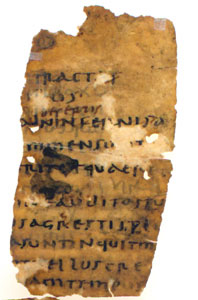Putting it All TogetherPapyrologists spend a lot of time poring over individual letters trying to reconstruct the text. Even a seemingly insignificant trace of ink can be essential for distinguishing a letter which has been otherwise lost. However, after many long days, even months, of studying the text at close range, the papyrologist must step back to study the text as a whole. In the previous section, you studied lines 24-33 of the fragment, trying to identify individual letters and words. Below is the full text of these lines (Medea verses 683-693) in Latin and also in English. The portions of the text corresponding to the fragments are in bold. This passage describes Medea performing a magic ritual which summons supernatural evils to her.
English:.. that the Taurus, paralyzed by Arctic cold, locks in perpetual
snow, (Translation after H.M. Hine)
Continue on for some more thoughts about this papyrus, and to finish the project. |
| Copyright 2004 The Regents of the University
of Michigan. Reading the Papyri is produced by the University of Michigan Papyrus Collection These pages designed and written by Terrence Szymanski. email: papywebmaster@umich.edu |
